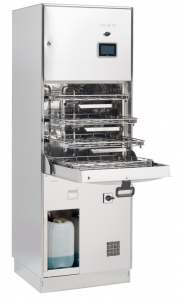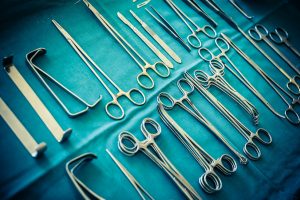Surgical Equipment
It’s vital that you take care of your surgical equipment. This will ensure they last longer and continue working properly.
Store
Always take care when handling surgical equipment. Many of the instruments are delicate, so be gentle. You must also store your surgical equipment appropriately. If they aren’t stored correctly, they may get damaged.
Rinse
Once used, surgical instruments should be rinsed immediately. By removing any biological material left on the equipment, you are preventing staining or even rusting. Despite being made of stainless steel, surgical equipment can still stain or rust, leading to pitting. You don’t want to use any equipment that has corroded.
 Clean and Sterilise
Clean and Sterilise
Just because you have removed the visible biological material, it doesn’t make the equipment safe to use. There will still be microorganisms on the equipment that are not visible.
These microorganisms and pathogens can be hazardous and, if not removed properly, can cause infection outbreaks. This is why sterilisation is so important.
You can manually wash equipment, but this is time-consuming, and there is no guarantee that equipment will be sterilised thoroughly.
 Washer Disinfectors
Washer Disinfectors
Best cleaning practices include using a washer disinfector. These automated cleaning machines disinfect safely and efficiently.
Washer disinfectors have pre-programmed cycles meaning your surgical equipment will be cleaned and disinfected correctly every time. With their control panels, you will be able to monitor the wash cycle and check to ensure the right temperatures have been met to disinfect the equipment.
Because any need to manually wash equipment is removed, washer disinfectors also make your workplace safer for your staff, who won’t have to handle contaminated equipment for long periods of time.
Test and Inspect
As part of your infection control policy, you should include regular testing of equipment. By testing and checking your surgical equipment, you are ensuring all instruments used are fit for purpose.
Look for damage or missing parts and check that the equipment is performing as expected. For example, check the jaws of forceps. Make sure they close fully, and the teeth are meshing. The jaws should meet perfectly with everything aligned. Also, check hinges for stiffness. They should be able to open and close freely. You can check the grip of a needle holder by placing a piece of 4/0 suture in the jaws, closing it and pulling the suture to check it doesn’t slip.
If any equipment doesn’t appear to work as it should, do not use it. Speak to your supplier and manufacturer about replacements.
Transport
Check how you transport your equipment to and from theatres. Make sure the containers they are moved in are not causing damage. Also, check that staff are not placing heavier instruments on top of smaller, more delicate instruments as this can also cause damage.
 Dekomed
Dekomed
We have helped hospitals and vets keep their surgical equipment safe and usable for thirty years. We understand how busy these work environments are and how critical it is to not allow any mistakes to occur during the cleaning process.
Our range of washer disinfectors helps give clients peace of mind. Equipment is cleaned and disinfected correctly and quickly, meaning you don’t have to worry about reusing equipment.
We provide a complete service from instalment to after-care. We want to make sure your washer disinfector lasts for years while working hard for you every day.
If you want to find out more, get in touch. We’d be happy to help.

